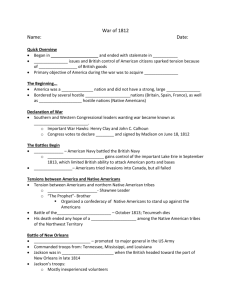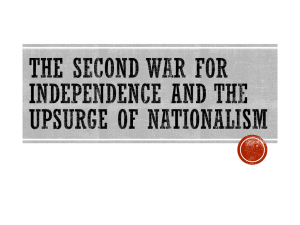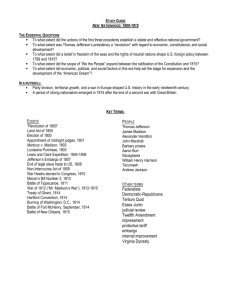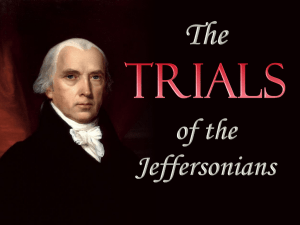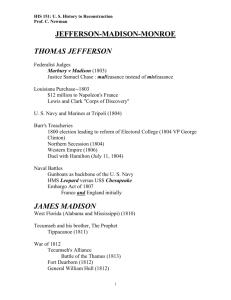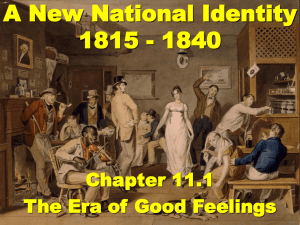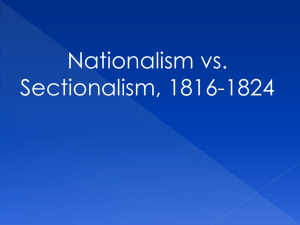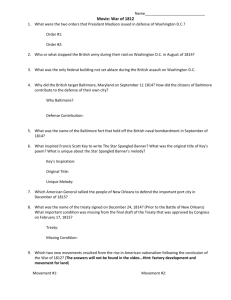FCHS Events of the Early 19th Century - fchs
advertisement
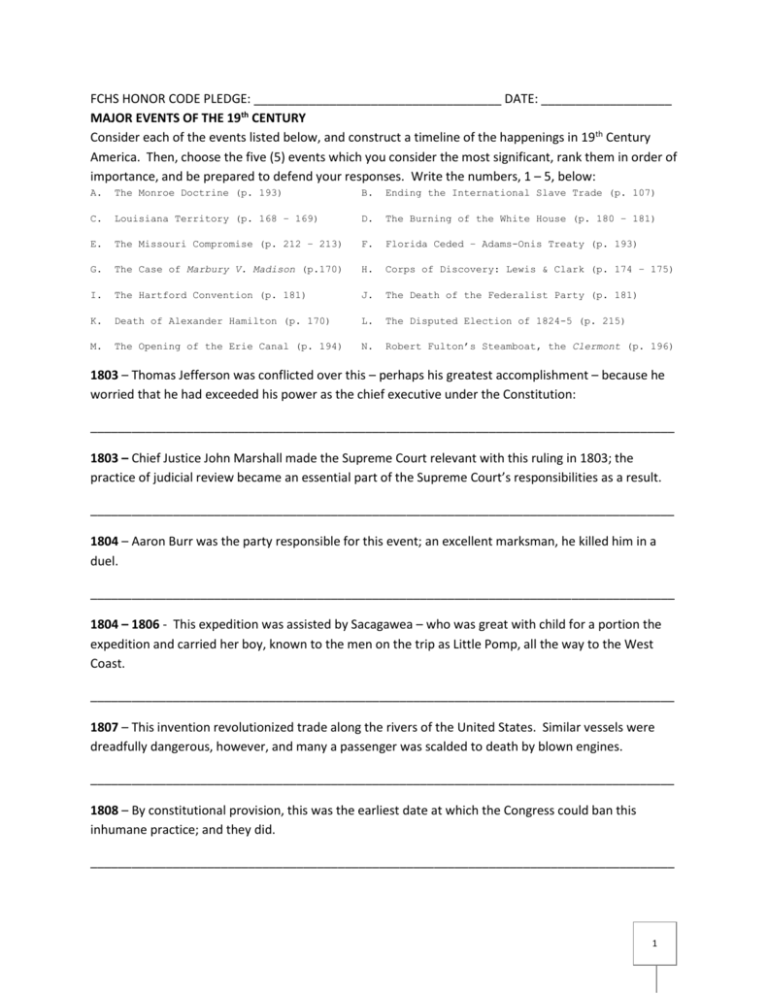
FCHS HONOR CODE PLEDGE: ____________________________________ DATE: ___________________ MAJOR EVENTS OF THE 19th CENTURY Consider each of the events listed below, and construct a timeline of the happenings in 19th Century America. Then, choose the five (5) events which you consider the most significant, rank them in order of importance, and be prepared to defend your responses. Write the numbers, 1 – 5, below: A. The Monroe Doctrine (p. 193) B. Ending the International Slave Trade (p. 107) C. Louisiana Territory (p. 168 – 169) D. The Burning of the White House (p. 180 – 181) E. The Missouri Compromise (p. 212 – 213) F. Florida Ceded – Adams-Onis Treaty (p. 193) G. The Case of Marbury V. Madison (p.170) H. Corps of Discovery: Lewis & Clark (p. 174 – 175) I. The Hartford Convention (p. 181) J. The Death of the Federalist Party (p. 181) K. Death of Alexander Hamilton (p. 170) L. The Disputed Election of 1824-5 (p. 215) M. The Opening of the Erie Canal (p. 194) N. Robert Fulton’s Steamboat, the Clermont (p. 196) 1803 – Thomas Jefferson was conflicted over this – perhaps his greatest accomplishment – because he worried that he had exceeded his power as the chief executive under the Constitution: _____________________________________________________________________________________ 1803 – Chief Justice John Marshall made the Supreme Court relevant with this ruling in 1803; the practice of judicial review became an essential part of the Supreme Court’s responsibilities as a result. _____________________________________________________________________________________ 1804 – Aaron Burr was the party responsible for this event; an excellent marksman, he killed him in a duel. _____________________________________________________________________________________ 1804 – 1806 - This expedition was assisted by Sacagawea – who was great with child for a portion the expedition and carried her boy, known to the men on the trip as Little Pomp, all the way to the West Coast. _____________________________________________________________________________________ 1807 – This invention revolutionized trade along the rivers of the United States. Similar vessels were dreadfully dangerous, however, and many a passenger was scalded to death by blown engines. _____________________________________________________________________________________ 1808 – By constitutional provision, this was the earliest date at which the Congress could ban this inhumane practice; and they did. _____________________________________________________________________________________ 1 1814 – Napoleon’s defeat at Waterloo led to this humiliating American defeat as an indirect consequence. _____________________________________________________________________________________ 1814 – 1815 – This was the first time in American history that the prospect of secession was raised – and it was a long way from South Carolina. _____________________________________________________________________________________ 1819 – This event was critical to the United States conquest of the North American continent; however, the victory was a diplomatic one. _____________________________________________________________________________________ 1820 - This was the opening round in a series of Union salvaging negotiations over the issue of slavery in the West. _____________________________________________________________________________________ 1823 – There is no reason to believe that the United States had the military capacity to back up its rhetoric during this period of our history. Nevertheless, President Monroe declared that the American continent was no longer available for subjugation by European empires. _____________________________________________________________________________________ 1824 – Andrew Jackson was robbed of the Presidency by a corrupt bargain – at least in his own mind. A formal divide emerged in the Republican Party thereafter, and the “Era of Good Feelings” was officially over! _____________________________________________________________________________________ 1825 – Funded by the State of New York and created by the backbreaking labor of Irish Immigrants, this project linked New York City with the port cities of the Great Lakes by way of the Hudson River and what was called at the time “the 8th Wonder of the World.” _____________________________________________________________________________________ 1828 (circa) – Andrew Jackson, when elected President, ended the notion of one party politics. The Whig party formed in opposition to Jackson – desiring Henry Clay’s “American System.” Meanwhile, the last vestiges of this party – which had started to fall into decline because of the Hartford Convention of 1814 - disappeared. _____________________________________________________________________________________ 2
